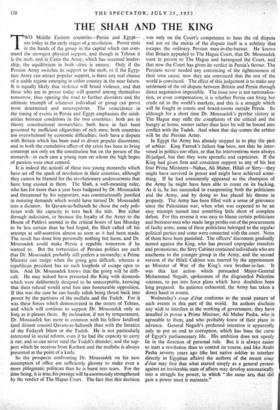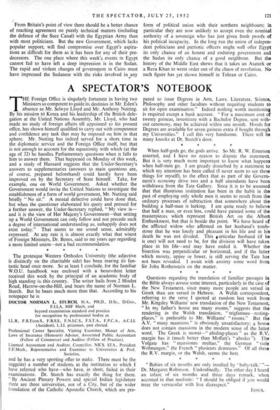THE SHAH AND THE KING
TWO Middle Eastern countries—Persia and Egypt— are today in the early stages of # revolution. Power rests in the hands of the group in the capital which can com- mand the strongest physical support, and though in Tehran it is the mob, and in Cairo the Army, which has assumed leader- ship, the equilibrium in both cities is uneasy. Only if the Persian Army switches its support to the mob, or if the Egyp- tian Army can attract popular support, is there any real chance of a stable regime emerging in either country in the near future. It is equally likely that violence will breed violence, and that those who are in power today will quarrel among themselves tomorrow, thus opening the road to further disorders and the ultimate triumph of whatever individual or group can prove most determined and unscrupulous. The coincidence in the timing of events in Persia and Egypt emphasises the simil- arities between conditions in the two countries : both are in theory constitutional monarchies; both have in fact been governed by inefficient oligarchies of rich men; both countries are overwhelmed by economic difficulties; both have a dispute with Britain which has been used to divert popular discontent; and in both the cumulative effect of the crisis has been to bring contempt not only on the constitution but on the person of the monarch—in each case a young man on whom the high hopes of patriots were once centred.
It is indeed the actioc of these two young monarchs which have set off the spark of revolution in their countries, although- they cannot be blamed for the revolutionary undercurrents that have long existed in them. The Shah, a well-meaning ruler, who has for more than-a year been badgered by Dr. Moussadek and threatened by his supporters, was constitutionally justified in resisting demands which would have turned Dr. Moussadek into a dictator. In Qavam-as-Sultaneh he chose the only poli- tician with the capacity to turn back the tide. But either through indecision, or because the loyalty of the Army to the House of Pahlevi seemed in the critical hours of last Monday to be less certain than he had hoped, 'the Shah 'called off his attempt at self-assertion almost as soon as it had been made. The result has done him personally nothing but harm, and Dr. Moussadek could make Persia a republic tomorrow if he wanted to. But the tortuosities of Persian politics are such that Dr. Moussadek probably still prefers a monarchy; a Prime Minister can resign when the going gets difficult, whereas a republican president has no such loophole of escape open to him. And Dr. Moussadek knows that the going will be diffi- cult. He may indeed have presented the King with demands which were deliberately designed to be unacceptable, knowing that their refusal would send him into honourable opposition. If this was the, case he can hardly relish being thrust back into power by the partisans of the mullahs and the Tudeh. For it was these forces which demonstrated in the streets of Tehran, and which will continue to support Dr. Moussadek only as long as it pleases them. By inclination, if not by temperament, Dr. Moussadek has more in common with his fellow landlord (and distant cousin) Qavam-as-Sultaneh than with the fanatics of the Fedayeh Islam or the Tudeh. He is not particularly interested in social reform, even if he had the capacity to carry it out, and so can never steal the Tudeh's thunder; and the sup- port which he receives from Kashani and the mullahs is always presented at the point of a knife.
So the prospects confronting Dr. Moussadek on his new assumption of office are sufficiently gloomy to make even a more phlegmatic politican than he is burst into tears. For the time being, it is true, his prestige will be enormously strengthened by the verdict of The Hague Court. The fact that this decision was only on the Court's competence to hear the oil dispute and not on the merits of the dispute itself i a subtlety that escapes the ordinary. Persian man-in-the-bazaar. He knows that Britain appealed to The Hague Court, that Dr. Moussadek went in person to The Hague and harangued the Court, and that now the Court has given its verdict in Persia's favour. The Persians never needed any convincing of the righteousness of their own cause; now they are convinced that the rest of the world is convinced. The effect of this judgement is to make any settlement of the oil dispute between Britain,and Persia through direct negotiation impossible. The issue now is not nationalisa- tion, or even compensation; it is whether Persia can bring her crude oil to the world's markets, and this is a struggle which will be fought in courts and board-rooms outside Persia. So although for a short time Dr. Moussadek's pyrrhic victory at The Hague may stifle the complaints of the critical and the - hungry at home, sooner rather than later he will be forced into conflict with the Tudeh. And when that day comes the arbiter will be the Persian Army.
In Egypt the Army has already stepped in to play the part of arbiter. King Farouk's failure has, been, not that he inter- vened in politics too often, or that his interventions were always ill-judged, but that they were sporadic and capricious. If the King had given firm and consistent support to any of his last four Prime Ministers—Nahas, Ali Maher, Hilali or Sirry—they might have survived in power and might have achieved some- thing. If he had consistently appeared as the champion of the Army he might have been able to count on its backing. As it is, he has succeeded in exasperating both the politicians and the Army, and by doing so has placed his throne in jeopardy. The Army has been filled with a sense of grievance since the Palestinian war, when what was expected to be an easy triumph turned into something little short of complete defeat. For this reverse it was easy to blame certain politicians and business-men who made large profits out of the procurement of faulty arms; some of these politicians belonged to the regular political parties and some were connected with the court. None of them have been punished. The officers' discontent gradually turned against the King, who has pressed unpopular transfers and promotions; the Sirry Cabinet contained individuals who are anathema to the younger group in the Army, and the second version of the Hilali Cabinet was marred by the appointment as Minister of War of the King's own brother-in-law. It was this last action which persuaded Major-General Mohammad Neguib, spokesman of the disgruntled Palestine veterans, to put into force plans which have doubtless been long prepared. Its patience exhausted, the Army has taken a direct hand in events.
Wednesday's coup d'etat conforms to the usual pattern of such events in this part of the world. Its authors disclaim any wish to interfere in the working of government; they have installed in power a Prime Minister, Ali Maher Pasha, who is agreeable to them, and who probably knew of their plans in advance. General Neguib's professed intention is apparently only to put an end to corruption, which has been the curse of Egypt's parliamentary life. His ambition does not openly lie in the direction of personal rule. But it is always easier to start a revolution than to control its course, and like Arabi Pasha seventy years ago (the last native soldier to interfere directly in Egyptian affairs) the authors of the recent coup d'etat may find that what started simply as a general protest against an intolerable state of affairs may develop automatically into a struggle for power, in which " the same arts that did gain a power must it maintain." "From Britain's point of view there should be a better chance of reaching agreement on purely .technical matters (including the defence of the Suez Canal) with the Egyptian Army than with most politicians. But the new Government, which lacks popular support, will find compromise over Egypt's aspira- tions as difficult for them as it has been for any of their pre- decessors. The one place where this week's events in Egypt cannot fail to have left a deep impression is in the Sudan. The rapid and violent changes of government in Cairo must have impressed the Sudanese with the risks involved in any form of political union with their northern neighbours; in particular they are now unlikely to accept even the nominal authority of a sovereign who has just given fresh proofs of his political incapacity. In the long run the union of indepen- dent politicians and patriotic officers might well offer Egypt its only chance of an honest and enduring government and the Sudan its only chance of a good neighbour. But the history of the Middle East shows that it takes an Ataturk or a Reza Khan to wrest order out of the chaos of revolution. No such figure has yet shown himself in Tehran or Cairo.



































 Previous page
Previous page